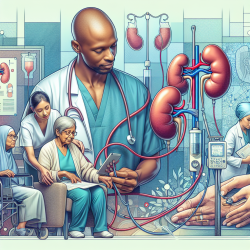Introduction
As practitioners, understanding the unique needs of older patients with advanced chronic kidney disease (CKD) is crucial. A recent qualitative study titled "Caring for older patients with advanced chronic kidney disease and considering their needs" sheds light on the gaps in communication and expectations between clinicians and patients. This blog aims to guide practitioners in improving their care strategies by implementing the study's findings.
Understanding the Study
The study involved interviews with nephrologists, primary care physicians, patients, and caregivers. It identified three key areas where expectations and experiences did not align:
- Dialysis discussions
- Dialysis decision-making
- Processes of advance care planning
Nephrologists focused on managing renal disease, while primary care physicians aimed to advocate for patients. However, patients and caregivers often lacked understanding of dialysis impacts and advance care planning.
Key Findings and Recommendations
1. Dialysis Discussions
Practitioners should ensure that discussions about dialysis include not only technical aspects but also lifestyle impacts. Patients need to understand how dialysis will affect their daily lives and what alternatives exist.
2. Dialysis Decision-Making
Nephrologists and primary care physicians should collaborate to align treatment decisions with patients' goals. It’s essential to involve patients in decision-making, ensuring they understand the implications of their choices.
3. Advance Care Planning
Advance care planning should be a joint effort between nephrologists and primary care physicians. Practitioners should initiate these discussions early, providing clear information about the patient's options and the potential outcomes.
Implementing Patient-Centered Education
To bridge the gap between clinicians and patients, practitioners should focus on patient-centered education. This involves:
- Providing comprehensive information about all treatment options, including conservative kidney management.
- Facilitating open discussions about the patient's goals and preferences.
- Using clear and simple language to explain medical terms and procedures.
Encouraging Further Research
While this study provides valuable insights, further research is needed to develop effective models for patient-centered education and communication. Practitioners are encouraged to explore new strategies and share their findings with the medical community.
Conclusion
By implementing these recommendations, practitioners can improve the care of older patients with advanced CKD. Ensuring patients and caregivers are well-informed and engaged in their care decisions is crucial for better health outcomes.
To read the original research paper, please follow this link: Caring for older patients with advanced chronic kidney disease and considering their needs: a qualitative study.










